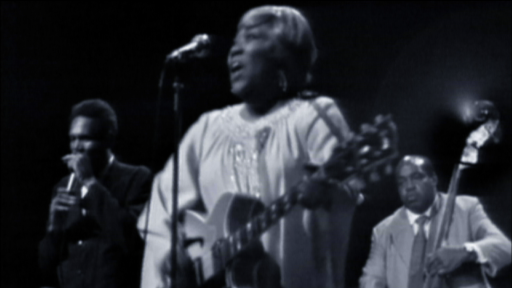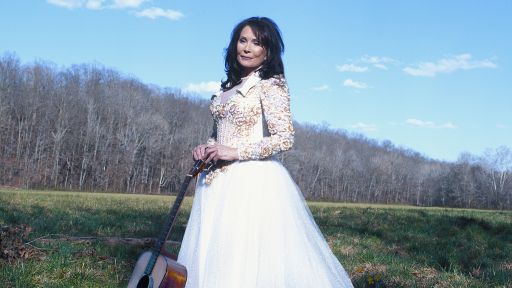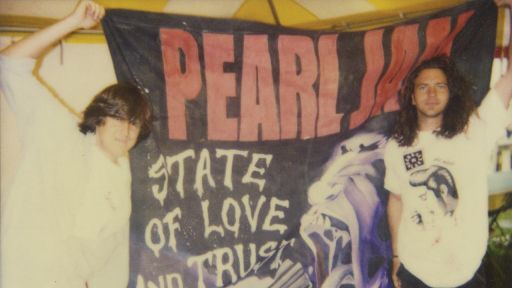Joni Mitchell’s life has been extraordinarily well-chronicled, thanks to books including Sheila Weller’s “Girls Like Us” and David Yaffee’s “Reckless Daughter,” as well as American Masters’ own film by Susan Lacy, Woman of Heart and Mind.
There’s also a website containing a library of what appears to be most every interview she’s ever given and every article ever written about her. But in the process, her biography has gotten out ahead of her musical output. Unlike some contemporaries who’ve been emptying their archives for decades, Joni Mitchell has kept an important part of her musical life story hidden – until now.
 For the first time, the story of Mitchell’s early career has a soundtrack: 2020’s “Joni Mitchell Archives Vol. 1: The Early Years (1963-1967).” It’s a five-CD box set that collects recordings she made beginning when she was 19 or 20 and continues until she’s just short of 24, about five months before her recorded debut. And it’s abundant with performances that enrich her story.
For the first time, the story of Mitchell’s early career has a soundtrack: 2020’s “Joni Mitchell Archives Vol. 1: The Early Years (1963-1967).” It’s a five-CD box set that collects recordings she made beginning when she was 19 or 20 and continues until she’s just short of 24, about five months before her recorded debut. And it’s abundant with performances that enrich her story.
First, we can hear her genesis as a guitarist. Now you may not think of Joni Mitchell as a guitar hero, but that’s exactly how musicians think of her. Jeffrey Pepper Rodgers, the former editor of “Acoustic Guitar” magazine, once wrote of her unique style: “The treble strings become a cool-jazz horn section; the bass snaps out syncopations like a snare drum; the notes ring out in clusters that simply don’t come out of a normal six-string.” The late John Guerin, a noted jazz drummer and Mitchell collaborator (and one of the loves of her life) put it more succinctly in Weller’s book: “She was the whole orchestra in one guitar!” For more evidence, both Jimi Hendrix and Prince were fans – enough said.
Yet unlike many superb guitarists who flash brilliance in their youth, Mitchell’s beginnings were modest as could be. In fact, she didn’t start out on the guitar at all. Her stern and controlling mother, Myrtle, wouldn’t buy her one. She told Yaffee that Myrtle said to her, “Oh no, no. You’ll just buy it and you’ll just quit. You’re a quitter.” So Mitchell saved for what she herself could afford, which turned out to be a thirty-six dollar baritone ukulele, an instrument whose four strings are traditionally tuned like the four highest strings on a guitar. On the first two 1963 recordings, we finally get to hear Mitchell on the uke, fingerpicking her way through one traditional song, “House of the Rising Sun,” and strumming on another, “John Hardy,” and while it’s all sure-handed, there’s little if any indication of the magic those hands will one day produce.
Her voice is another story. She takes ownership of the melancholy Irish folk song, “Molly Malone,” phrasing lithely as she tells the tale of the pretty young fishmonger who sells her wares from a wheelbarrow on the street much as her parents did before her. Mitchell, an original even then, also gives her own sad twist to the traditional melody, gracefully alternating between major and minor chords as the song concludes with the death of young Molly. It’s a marvel of sophistication from a performer not yet 21.
Next come recordings from late 1964, with Mitchell performing in the Yorkville section of Toronto under the name Joni Anderson (she had been born Roberta Joan Anderson). Much has been written about how Mitchell, single and noticeably pregnant at the time, nonetheless took to the stage in an era when doing so was more likely to generate shame than acclaim. (She once told reporters a condition like hers was considered “scandalous and disgraceful. It was like you murdered somebody.”) It was a move that speaks not only to Mitchell’s courage but also Yorkville’s place as the vanguard of Canada’s folk and what soon came to be called counterculture scene. And again, the music picks up where the biographical detail leaves off. Not only does Mitchell deliver a gorgeous performance, she is also completely at ease, as can be heard when, before “Sail Away,” a calypso number with a complicated melody difficult for anyone to sing, she nonetheless invites the audience to sing along. “Any strange harmony you come up with is appreciated,” she says.
By 1967, Mitchell had undergone two transformative experiences, one musical, another deeply personal. The musical one: Eric Anderson, one of her singer/songwriter peers, had taught her how to tune her guitar in an open chord. As opposed to standard guitar tuning, open tuning allows the player to strum a familiar chord, say, a G major, with her right hand without using her left at all, and to form related chords with little stress on the left. This was helpful to Joni, whose left had had been weakened by a childhood bout with polio. The new tuning had opened up new horizons in her songwriting, and now we can begin to hear the the chiming sounds she became known for on classics she had yet to record, like “The Circle Game” and “Cactus Tree.”
The personal one: she had given birth and given her baby daughter up for adoption, but not before giving her a name: Kelly. Mitchell would soon compose a song about her experience and the girl, “Little Green,” that would become a classic when she finally released it on her 1971 masterpiece, “Blue.” The performance on that recording, like all those on “Blue,” has often been described as emotionally naked, and Mitchell diehards have the lyrics memorized:
Just a little green
Like the color when the spring is born
There’ll be crocuses to bring to school tomorrow
Just a little green
Like the nights when the northern lights perform
There’ll be icicles and birthday clothes
And sometimes there’ll be sorrow
On the “Archives” you can hear her singing the song live in Ann Arbor, Michigan, nearly four years before she released it, and somehow on this version she manages to create a moment even more soul-baring, changing the words “little green” to “Kelly green” in the song’s final chorus.
There are additional autobiographical touches found in the stage patter on the “Archives” as well: Mitchell informs the audience that her father once led a military marching band in Moose Jaw, Canada. You can also hear the aplomb with which the young performer breaks into an a cappella number after she breaks a guitar string (an occupational hazard for players who wind and rewind their guitar strings into various open configurations). But it’s the music – music unreleased and mostly unheard for more than half a century – that completes a story that biographies can only partially tell.
Tom Casciato is a documentary filmmaker and a Special Correspondent for PBS NewsHour Weekend.










